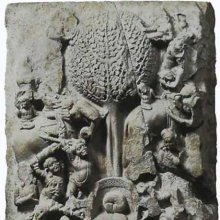Paris, Parish, Pāriṣ: 4 definitions
Introduction:
Paris means something in Hinduism, Sanskrit, biology, Tamil. If you want to know the exact meaning, history, etymology or English translation of this term then check out the descriptions on this page. Add your comment or reference to a book if you want to contribute to this summary article.
The Sanskrit term Pāriṣ can be transliterated into English as Paris or Parish, using the IAST transliteration scheme (?).
Images (photo gallery)
Biology (plants and animals)
Source: Google Books: CRC World Dictionary (Regional names)Paris in English is the name of a plant defined with Paris polyphylla in various botanical sources. This page contains potential references in Ayurveda, modern medicine, and other folk traditions or local practices It has the synonym Paris polyphylla Hand.-Mazz., nom. illeg., non Paris polyphylla Sm. (among others).
Example references for further research on medicinal uses or toxicity (see latin names for full list):
· Cytologia (1979)
· Cell and Chromosome Research (1989)
· Sitzungsberichte der Kaiserlichen Akademie der Wissenschaften, MathematischNaturwissenschaftlichen Classe, Abteilung (1880)
· Cytologia (1999)
· Acta Botanica Yunnanica (1982)
· The Cyclopaedia (1813)
If you are looking for specific details regarding Paris, for example diet and recipes, side effects, chemical composition, extract dosage, health benefits, pregnancy safety, have a look at these references.

This sections includes definitions from the five kingdoms of living things: Animals, Plants, Fungi, Protists and Monera. It will include both the official binomial nomenclature (scientific names usually in Latin) as well as regional spellings and variants.
Languages of India and abroad
Sanskrit dictionary
Source: Cologne Digital Sanskrit Dictionaries: Benfey Sanskrit-English DictionaryParis (परिस्).—see kṛ with pari.
Source: Cologne Digital Sanskrit Dictionaries: Cappeller Sanskrit-English DictionaryParīṣ (परीष्).—look about for ([accusative]).
Parīṣ is a Sanskrit compound consisting of the terms pari and iṣ (इष्).
Source: Cologne Digital Sanskrit Dictionaries: Monier-Williams Sanskrit-English Dictionary1) Parīś (परीश्):—(pari-√īś) [Ātmanepada] parīṣṭe, to be able to ([infinitive mood]), [Kāśī khaṇḍa, from the skanda-purāṇa]
2) Parīṣ (परीष्):—(pari- 3 √iṣ) [Parasmaipada] pary-eṣati ([Aorist] pary-aiṣiṣat), to seek or search about for, [Chāndogya-upaniṣad; Mahābhārata];—([Ātmanepada]), [Saddharma-puṇḍarīka] :—[Causal] pary-eṣayati idem, [Saddharma-puṇḍarīka]
Sanskrit, also spelled संस्कृतम् (saṃskṛtam), is an ancient language of India commonly seen as the grandmother of the Indo-European language family (even English!). Closely allied with Prakrit and Pali, Sanskrit is more exhaustive in both grammar and terms and has the most extensive collection of literature in the world, greatly surpassing its sister-languages Greek and Latin.
See also (Relevant definitions)
Starts with (+660): Paricacculai, Paricai, Paricaikkaran, Paricakam, Paricakirakanam, Paricakkaram, Parical, Paricam, Paricamani, Paricampotu, Paricamvilu, Paricanaivaittiyan, Paricanan, Paricanati, Paricanavakuti, Paricanaveti, Paricancey, Paricani, Paricankilattal, Paricanniyam.
Ends with: Herb paris.
Full-text (+1122): Paryeshana, Gamasima, Parishpatti, Parish's glasswort, Samanasima, Parish's goldenpoppy, Parish's poppy, Agropiro de parish, Paryeshtavya, Dendrobium hymenanthum, Arthrocnemum subterminale, Chandogapaddhati, Herb paris, Paryeshti, Gamasahassa, Paris polyphylla, Sima, Daiswa, Dudhiabauj, Coelogyne fuscescens.
Relevant text
Search found 72 books and stories containing Paris, Parish, Parīṣ, Pari-ish, Pari-iṣ, Pari-is, Parīś, Pāriṣ; (plurals include: Parises, Parishes, Parīṣs, ishes, iṣs, ises, Parīśs, Pāriṣs). You can also click to the full overview containing English textual excerpts. Below are direct links for the most relevant articles:
Anāgārika Dharmapāla (by Bhikkhu Sangharakshita)
Mrs. Foster’s Help – England – Industrial School in Sarnath
Paris – London –Rome (1897) – Back in Ceylon (1898) –Touring India
Dipavamsa (study) (by Sibani Barman)
Trespasser < [October – December, 1988]
The Throne and the Mire < [July – September, 1979]
Nandigram, The Moaning Village < [April – June, 2008]
Philosophy of language in the Five Nikayas (by K.T.S. Sarao)
2.2. The Second Buddhist Council < [Chapter 1 - Introduction]
11.2. Metonymy < [Chapter 5 - Language and Thought]
The Literature of the Ancient Egyptians (by E.A. Wallis Budge)
Editions Of Egyptian Texts, Translations, &c.
Chapter V - Books Of The Dead Of The Græco-roman Period
Complete works of Swami Abhedananda (by Swami Prajnanananda)
Chapter 9 - Shintoism in Japan < [Discourse 7 - Thoughts on Sankhya Buddhism and Vedanta]
Chapter 3 - Faith and Knowledge < [Discourse 5 - Path of Realization]
Chapter 4 - Political Institutions of India < [Discourse 1 - India and Her People]
Related products





